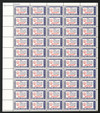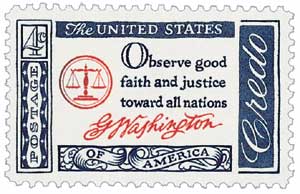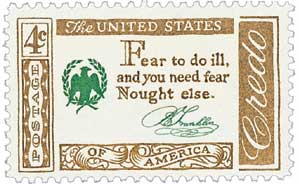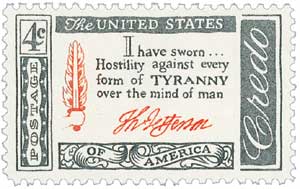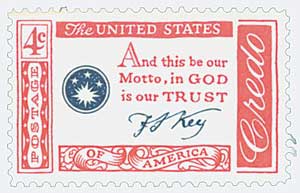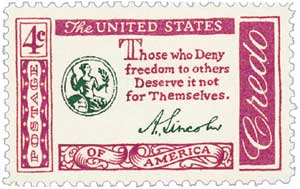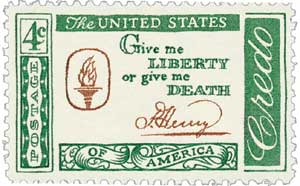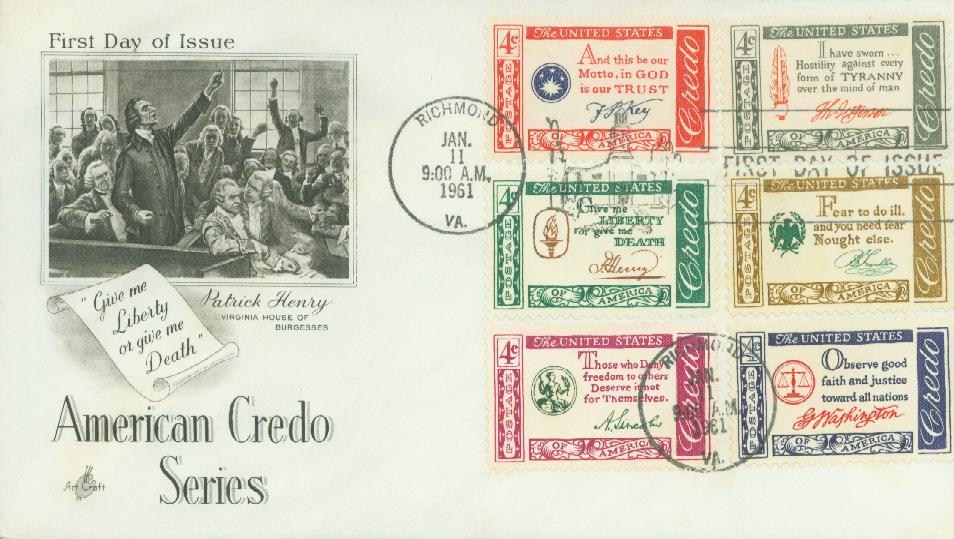
# 1139 - 1960 4c American Credo: George Washington
American Credo Series
US #1139 was the first of the American Credo Series stamps to be issued. It pictures the scales of justice and was first released at Washington’s home in Mount Vernon, Virginia. The stamp includes a line from George Washington’s farewell speech in 1796. Washington’s 1796 farewell speech served as the foundation for a substantial portion of American domestic and foreign policy.
US #1140 was issued in Philadelphia, Pennsylvania, where Ben Franklin made his home as one of America’s Founding Fathers. The stamp shares one of the sayings for which Franklin became famous, taken from his pamphlet, Poor Richard’s Almanack.
The third stamp, US #1141, was issued in Charlottesville, Virginia. The quote was taken from the Collected Writings (Volume 10) of Thomas Jefferson. The original quote was part of an 1800 letter from Jefferson to Benjamin Rush. In addition to the quote and Jefferson’s signature, the stamp also pictures a hand holding a flaming sword.
“And this be our Motto, in GOD is our TRUST.”
US #1142 was issued in Baltimore, Maryland, on the anniversary and at the location where Francis Scott Key wrote the “Defense of Fort McHenry.” The poem, once set to a tune popular at the time called “To Anacreon in Heaven,” became the “Star-Spangled Banner,” and our nation’s national anthem. The popular form of the anthem only features the first stanza. Key’s lyrics included four stanzas, with the highlighted quotation appearing at the end of the song: “And this be our motto: ‘In God is our trust’ / And the star-spangled banner in triumph shall wave / O’er the land of the free and the home of the brave!”
“Those who deny freedom to others deserve it not for themselves.”
The fifth stamp in the series, US #1143, was issued on the anniversary of Lincoln’s Gettysburg Address. The quote on the stamp was taken from an April 1859 letter Lincoln wrote to Henry L. Pierce, about having to decline an invitation to attend a festival in Boston in honor of Thomas Jefferson’s birthday. Lincoln’s letter remarked upon the development of the two-party political system in America and Jefferson’s role as the head of one of them. Lincoln further explored the ideas of freedom and responsibility, and how it applied to the slavery issue that was dividing the nation. The line before the quote above stated, “This is a world of compensation, and he who would be no slave must consent to have no slave.”
The final stamp in the series, US #1144, was issued on January 11, 1961, in Richmond, Virginia. Henry is best known for his 1775 speech to the House of Burgesses in which he urged the legislature to take military action against the British. The deeply divided house was close to deciding against committing troops when Henry rose to speak. He ended his speech with his most famous words, “I know not what course others may take, but as for me, give me liberty or give me death!” The speech is credited with convincing Virginians to join the Revolutionary War.
American Credo Series
US #1139 was the first of the American Credo Series stamps to be issued. It pictures the scales of justice and was first released at Washington’s home in Mount Vernon, Virginia. The stamp includes a line from George Washington’s farewell speech in 1796. Washington’s 1796 farewell speech served as the foundation for a substantial portion of American domestic and foreign policy.
US #1140 was issued in Philadelphia, Pennsylvania, where Ben Franklin made his home as one of America’s Founding Fathers. The stamp shares one of the sayings for which Franklin became famous, taken from his pamphlet, Poor Richard’s Almanack.
The third stamp, US #1141, was issued in Charlottesville, Virginia. The quote was taken from the Collected Writings (Volume 10) of Thomas Jefferson. The original quote was part of an 1800 letter from Jefferson to Benjamin Rush. In addition to the quote and Jefferson’s signature, the stamp also pictures a hand holding a flaming sword.
“And this be our Motto, in GOD is our TRUST.”
US #1142 was issued in Baltimore, Maryland, on the anniversary and at the location where Francis Scott Key wrote the “Defense of Fort McHenry.” The poem, once set to a tune popular at the time called “To Anacreon in Heaven,” became the “Star-Spangled Banner,” and our nation’s national anthem. The popular form of the anthem only features the first stanza. Key’s lyrics included four stanzas, with the highlighted quotation appearing at the end of the song: “And this be our motto: ‘In God is our trust’ / And the star-spangled banner in triumph shall wave / O’er the land of the free and the home of the brave!”
“Those who deny freedom to others deserve it not for themselves.”
The fifth stamp in the series, US #1143, was issued on the anniversary of Lincoln’s Gettysburg Address. The quote on the stamp was taken from an April 1859 letter Lincoln wrote to Henry L. Pierce, about having to decline an invitation to attend a festival in Boston in honor of Thomas Jefferson’s birthday. Lincoln’s letter remarked upon the development of the two-party political system in America and Jefferson’s role as the head of one of them. Lincoln further explored the ideas of freedom and responsibility, and how it applied to the slavery issue that was dividing the nation. The line before the quote above stated, “This is a world of compensation, and he who would be no slave must consent to have no slave.”
The final stamp in the series, US #1144, was issued on January 11, 1961, in Richmond, Virginia. Henry is best known for his 1775 speech to the House of Burgesses in which he urged the legislature to take military action against the British. The deeply divided house was close to deciding against committing troops when Henry rose to speak. He ended his speech with his most famous words, “I know not what course others may take, but as for me, give me liberty or give me death!” The speech is credited with convincing Virginians to join the Revolutionary War.






